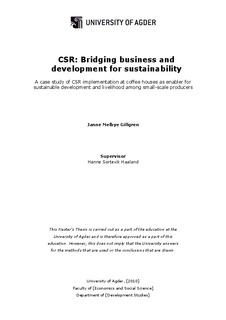| dc.description.abstract | A prerequisite for achievement of sustainable development is economical growth (NorwegianGovernment, 2008-2009). Today an increasing number of corporations in the Western world implement the concept of Corporate Social Responsibility (CSR) (NorwegianEmbassyMexico, 2010a; NorwegianGovernment, 2008-2009). Accountability theories suggests that CSR initiatives increases transparency and accountability of a company, which again increases its legitimacy (Bendell, 2000; Utting, 2005). CSR is makes ―(…) companies integrate social and environmental concerns in their business operations and in their interaction with their stakeholders on a voluntary basis” (EU Commission, 2001, p. 6 in Kalstad 2006, p. 10). Fairtrade is a concept which cutting back on middlemen, making a larger degree of the surplus stay with the producer, providing an averagely higher price, a higher degree of life security, and possibly a more sustainable livelihood among rural poor in the South (Aranda, 2002; Bacon, 2004; Boersma, 2002; Jaffee, 2007; Murray, 2003; Ronchi, 2002; Wise, 2005). To reach out Fairtrade is dependent on manufacturers to sell their product. Is Fairtrade sustainable, in the manner that the corporations will continue to sell certified coffee? When CSR is realized through Fairtrade involvement, does it contribute to sustainable development? Several studies documents Fairtrade‟s effect, and CSR too, though not interlinked. When so; do they interact as an alternative to aid, contributing to sustainable livelihood, creating a mutual partnership between international and local actors?
The empirical investigation is based on a case study of five Coffee Houses in Norway, and the members of MICHIZA, a small-scale coffee producer cooperative in Oaxaca, Mexico. In addition a literature study has been carried out.
All corporations have a CSR strategy, and are either selling or have sold Fairtrade certified coffee. They are selling the certified coffee due to demand, though also as part of their CSR strategy, operating more environmental and social responsible. The corporations have realized that selling certified coffee is more sustainable for all parties, and they profit on it, being able to maintain quality and production in the long run which if not organic produced threathens to deploy the soil creating an environmental threathening production. Selling Fairtrade coffee may easily be part of the corporations CSR strategies; and the production will persist, due to a mutual benefit.
MICHIZA‟s members are producing Fairtrade certified organic coffee. Being organized in MICHIZA has contributed to improve life, a more sustainable livelihood, though not at all areas, and not sufficiently. The corporations realize this, though handle by having a variety of different development projects, though not necessary directed towards the coffee producers. Fairtrade however have contributed to MICHIZA‟s members improved living conditions, and more sustainable livelihood and development.
CSR may be implied as development enabler; economical growth is a prerequisite for sustainable development. When economical investment is mutual beneficial it is more likely to be maintained. CSR realized through Fairtrade creates an environment for sustainability, and some corporations have realized the mutual dependency for assurance of future production, and sale. And not atleast does the producers, corporations and consumers of coffe all benefit on it. | en_US |
